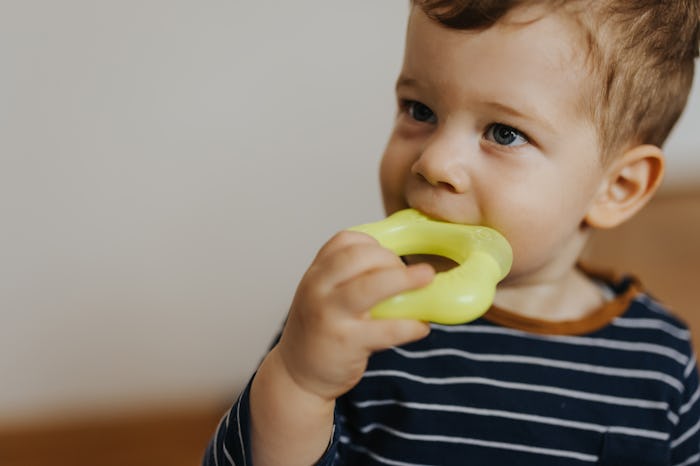Toddler

Ugh, Here's Why Teething Seems To Take So Long For Your Kid
The whole process can take years.
When your baby gets their first tooth, it's adorable. That gummy grin with that single tooth popping up is pretty much the best — until those pesky pointy teeth start pushing through and your baby hates life. And let's not even talk about how bad molars are. Years later, many parents might still recall the sleep they missed on those long nights. It helps knowing that the time is finite, but how long does it last? When do babies stop teething?
For starters, teething (or odontiasis) is what occurs when teeth first come through your baby's gum line. It’s a strange concept to think about in terms of sensations, because pretty much no adult can recall what it felt like to have their first teeth come in. That being said, parents can expect general fussiness, irritability, restlessness, trouble sleeping, and maybe even loss of appetite in your little one. All in all, it’s a rough time for everyone involved.
The process can feel like a lengthy one, not just because some kids have a stronger reaction to it than others, but because the actual timeline is longer than you might think. So, when does teething stop? For all you need to know about when toddlers stop teething and how to soothe your little one’s discomfort, read on.
How long does teething last?
Unfortunately for everyone involved, baby teeth take their precious time coming in. “The first tooth usually comes in on average around 6 months of age,” Dr. Lisa Bienstock, board-certified pediatric dentist, tells Romper. “They typically arrive in pairs and a child will have all 20 baby teeth by age 3. A child typically loses their baby teeth in the same order they get them.” Yes, you read that right — it takes years.
Though there is a rough timeline, don't be alarmed if your child’s teeth erupt early or a bit late, because there is large variability in eruption timelines — in fact, girls tend to have tooth eruption earlier than boys, according to recent studies. Like any development or growth milestone, there's a range to what is considered normal. If your child isn't getting their teeth when you think they should, most of the time it's not actually a cause for concern. If your baby is otherwise developing normally, it could be hereditary, or it could be that your child is just a late bloomer.
According to Bienstock, you should consider taking your child to a pediatric dentist “when the first tooth appears or by your child's first birthday,” so your child can become accustomed to going to the dentist. If your child doesn’t have any teeth by the age of 18 months, you should take them in for an evaluation.
Signs of teething
Beware, while your child is teething, they might have some uncomfortable side effects that cause pain. “Swollen gums, excessive drool (which sometimes causes a rash on their face), fussiness, putting everything in the mouth, wanting to chew or gnaw on things including their own fingers, and pulling on their ears” are all potential symptoms, Bienstock explains. “Some parents report a slight fever or diarrhea.” Note that a slight fever means a low-grade temperature (lower than 101 degrees Fahrenheit or 38.3 degrees Celsius).
Don’t be surprised if your little one’s gut reaction to having their teeth erupt is to stick their hands in their mouth. “At some point, their teeth start to erupt, and they also come to realize how helpful those hands can be for the teething process too,” Dr. Sahira Long,M.D., medical director of Children’s Health Center Anacostia in Washington, D.C., previously told Romper. “Hands are the only teething tool most babies can get into their mouths without relying on someone else to supply it, and they don’t have to worry about dropping it."
How to ease teething discomfort
Teething can be nasty — for both you and your child (but mostly your child). There are some at-home remedies and solutions to help with the discomfort and pain, though. “Parents can turn to cold items like frozen spoons, clean frozen wet washcloths, teething rings, and massaging their gums,” Bienstock says. “Parents could also use an infant weight-appropriate dose of Tylenol, or if over 6 months, a weight-appropriate dose of Ibuprofen.”
Rubbing their gums with a cold spoon off and on during the week to week-and-a-half-long period it takes for a tooth to erupt is one of the more popular teething remedies, as it not only provides pressure to the pained area, but the cool metal is also soothing and familiar for young kids.
As with all things, if you are worried or have questions about anything related to your child’s health and teething, such as discomfort, symptoms, and growth timeline, talk to your pediatrician or pediatric dentist. Teething isn't fun, and sometimes it feels like the parents need more Ibuprofen than the kids to get through it. Thankfully, by the time they're about 3 years old and causing havoc for other reasons, they can do it with all their teeth.
Study referenced:
Kutesa, A., Nkamba, E. M., Muwazi, L., Buwembo, W., & Rwenyonyi, C. M. (2013). Weight, height and eruption times of permanent teeth of children aged 4-15 years in Kampala, Uganda. BMC oral health, 13, 15. https://doi.org/10.1186/1472-6831-13-15
Experts:
Dr. Lisa Bienstock, board-certified pediatric dentist
Dr. Sahira Long, M.D., medical director of Children’s Health Center Anacostia in Washington, D.C.
This article was originally published on